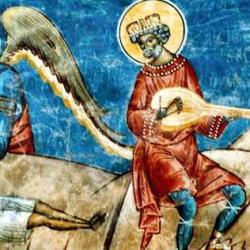Athanasius points out to Marcellinus that the Psalms cover every “eventuality.” They are a mirror of the soul because they are a mirror of human experience – of suffering, of desperation, of exultation, of thanksgiving, of prosperity, of adversity, of garden and wilderness, of isolation and communion, and on and on. They are a mirror of the soul because they are a mirror of our emotional life, including every permutation of passion.
More than mirror, though: Through singing the Psalms, the diverse passions of the soul, Athanasius argues, are trained and harmonized. Praising God “in well-tuned cymbals and harp and ten-stringed instrument was again a figure and sign of the parts of the body coming into natural concord like harp strings, and of the thoughts of the soul becoming like cymbals, and then all of these being moved and living through the grand sound and through the command of the Spirit so that, as it is written, the man lives in the Spirit and mortifies the deeds of the body.”
In short, by “beautifully singing praises, he brings rhythm to his soul and leads it, so to speak, from disproportion to proportion.”











